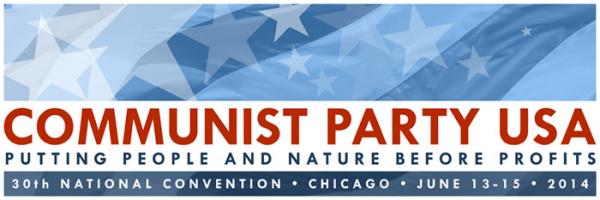
Submitted by Scott Hiley, Chicago, IL
As the Communist Party USA prepares for its 30th National Convention, our discussion forums have seen lively debates about the future of our Party, our connection to the American working class, and the language and symbols we use in our organizing.
This last point has proven to be particularly contentious, and the discussion of our political and ideological language-the terms we use to describe our theoretical and tactical orientation-animates many of the debates in the convention materials.
Put briefly, one side claims that we must remain faithful to the traditional terminology of our Party and, indeed, of the world Communist movement. Omitting a term like “Marxism-Leninism,” they argue, is simply a back door route to significant ideological changes being undertaken without proper consideration. On the other side, comrades argue that as the composition of the working class and the nature of the terrain of struggle changes, so too must our language and symbols change to remain timely and relevant.
In this debate, we seem to take two things for granted: first, that the language question boils down to whether to preserve or jettison existing terminology; moreover, that we can craft a language in the same way we might a policy or a tactic.
To my mind, neither of these propositions are true. Instead, changing the focus of our debate from what terms we should use to how we should cultivate language offers the best path to a productive re-evaluation of how the CPUSA talks about working class struggle, socialism, and revolution.
I would like to present a few ideas about what obstacles we face, what theoretical considerations ought to guide us, and what concrete steps we can take to bring a vibrant, fighting language to the struggle of the American working class.
I. What obstacles do we face in mass communication?
Language, like all other aspects of life under capitalism, is a terrain of class struggle.
On the one hand, language is democratic. It evolves through the development and spread of words, expressions, and speech patterns on a mass basis. It resists any attempts to program, restrict, or regulate it.
On the other hand, the capitalist class plows the profits extracted from our labor into maintaining control of the mass media, communications technology, and educational institutions. The capitalist class uses its power in two ways to counter the democratic structures of language:
-
First, it uses language as tool to divide and exclude. A good example is the “English Only” movement, which uses linguistic differences to stir up anti-immigrant paranoia. Another is the concept of “Standard American English,” which takes the speech patterns of the white ruling class as the norm and marginalizes other ways of speaking as deficient or inappropriate.
-
Then, it replaces the exchange of ideas and information with PR and marketing. The purpose of language, under capitalism, is not to share information or promote analysis, but to acquire the loyalty of consumers by relentless rebranding of content. The process of rebranding extends from advertising to politics: affirmative action becomes “reverse racism”; free-market capitalism becomes “economic liberty”; and fascist insurgencies become “democratic revolutions.”
The impact of these tactics on the language of the Party, and the broader Left, should not be underestimated.
For instance, just as capitalism produces exclusionary language, some on the Left take pride in using language as a litmus test to decide who is truly revolutionary. In this case, terms like “Marxism-Leninism” can become passwords to exclude the “backward” masses from some imagined revolutionary vanguard. Such exclusionary and divisive use of language only serves the ruling class.
On the other hand, just as capitalism works for the loyalty of consumers rather than the engagement of citizens, we have sometimes been too willing to approach the question of our political and ideological language as a marketing problem. Can we replace one term with another, more “modern” one? Can we set up a focus group to see whether people like a certain slogan or image? This is the approach of capitalist marketing to build brand loyalty. While branding strategies have their place in the effort to raise awareness of the Communist Party, they do not produce ideological or political engagement.
II. How should we approach our mass communication work?
At the root of the problem, both of these tendencies focus too much on what our language should be. In other words, we tend to think of changing our language, or our image, as a process of deciding what words or symbols we should use, and which ones we should scrap.
This approach is, I think, bound to fail. It reminds me of when misguided cultural workers under Stalin decided that Afro-American jazz was decadent and should be replaced with a more “authentically proletarian” music.
Stalin’s efforts failed because of an ideological misunderstanding of art and culture under socialism. To create socialist art doesn’t mean mandating new subjects or new styles, making sculptures of tractors or love poetry about industrial machines; it only requires that the means and training to produce art be made available to everyone.
In the same way, creating a political language for American socialism that is inspiring, accessible, and concrete does not require deliberate decisions to banish some terms or symbols and cultivate others. It only requires that the means to intervene in discussion and debate be radically democratized. The rest comes with time.
III. Where will an authentic language of working class struggle come from?
I am not suggesting that the language we need will develop spontaneously. On the contrary, it will require a great deal of careful and conscious work. However, that work should be the work of building the kind of Party whose language evolves through ever-growing participation by comrades and allies.
Instead of asking what our language should be, we should ask how it should come to be-under what conditions the language we want will come into existence.
The Convention committee has already taken admirable steps in this direction by setting up a platform for pre-convention discussion where comrades can participate by written submission or by audio and video submissions, as well as by encouraging local clubs to devote meetings to open discussions of the convention topics.
Here, I think, are the necessary steps to create within our Party the kind of culture that will generate a language that is truly based in mass struggle and in the best traditions of the American working class.
1.) Growing the Party (though this is true of efforts to improve in every area of our mass work) to include more, and a broader array of, voices of our class and people.
2.) Intensive work to broaden the writership of the Peoples World and Political Affairs. Wherever feasible, each local club should establish a Writers’ Collective, where experienced writers and editors can collaborate with newer hands to produce and edit articles.
3.) An extension and amplification of member-directed study groups. In addition to “Marxism 101” series, districts and clubs should encourage the formation of groups where members come together to discuss brief readings or topical questions. These groups should not be under fixed leadership; instead, comrades (and allies from outside the Party) should take turns facilitating discussion. Each group should keep brief summaries of its deliberations.
4.) A full-time, moderated “members only” discussion page, modeled on the pre-convention discussion pages, where comrades can discuss questions or criticism of Party tactics without violating democratic centralism.
5.) Re-orientation of “Marxism 101” educationals. Instead of asking students to learn or understand something, we should ask them to produce something: a slogan, a brief description of a phenomenon, a role play discussion with an ideological opponent…
In short, we must give up the idea that the language and symbols we need will come from within. As our Party grows, we are in contact with ever broader sections of our society’s multiracial working class, in all its richness and creativity. Our task is to construct an educational apparatus that can seize the emergence of new words, new songs, new slogans, new images, and translate them into powerful weapons of struggle.
So, let us grow and build into the kind of Party that can give full voice to the creativity and passion of the working class. As we do so, the questions of language and symbols will resolve themselves. To borrow the words of comrade Emile Scheppers, “May a hundred symbols flourish!”
The views and opinions expressed in the Convention Discussion are those of the author alone. The Communist Party is publishing these views as a service to encourage discussion and debate. Those views do not necessarily reflect the views of the Communist Party, its leading bodies or staff members. The CPUSA Constitution, Program, and all its existing policies remain in effect during the Convention discussion period and during the Convention.
For details about the convention, visit the Convention homepage
To contribute to the discussion, visit the Convention Discussion webpage
CONVENTION DISCUSSION
30th National Convention, Communist Party USA
Chicago | June 13-15, 2014


 Join Now
Join Now